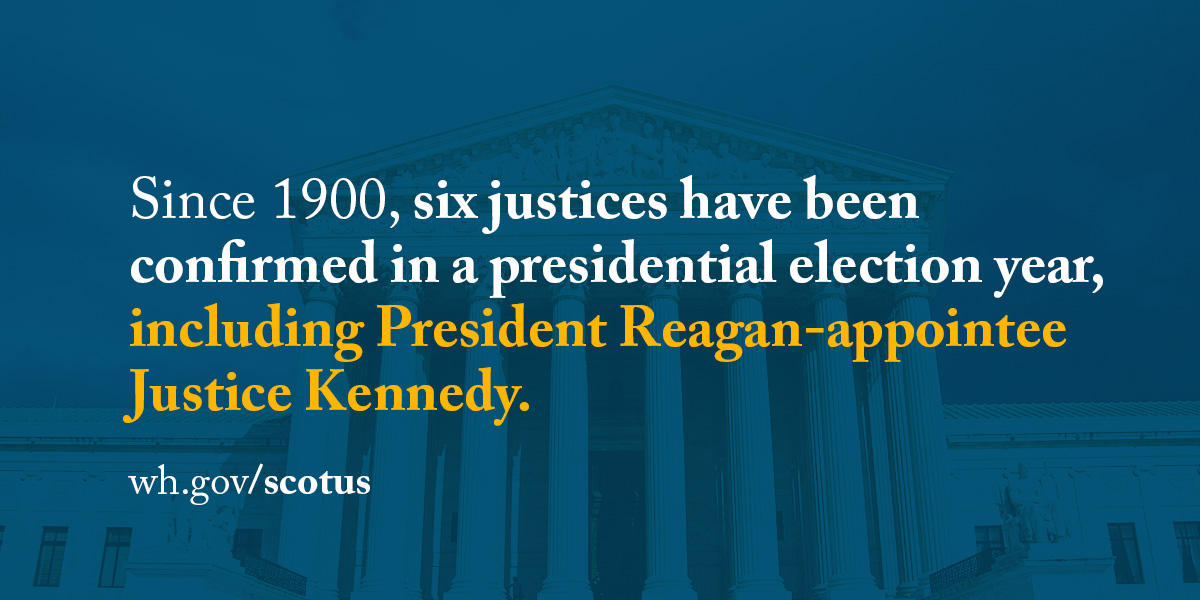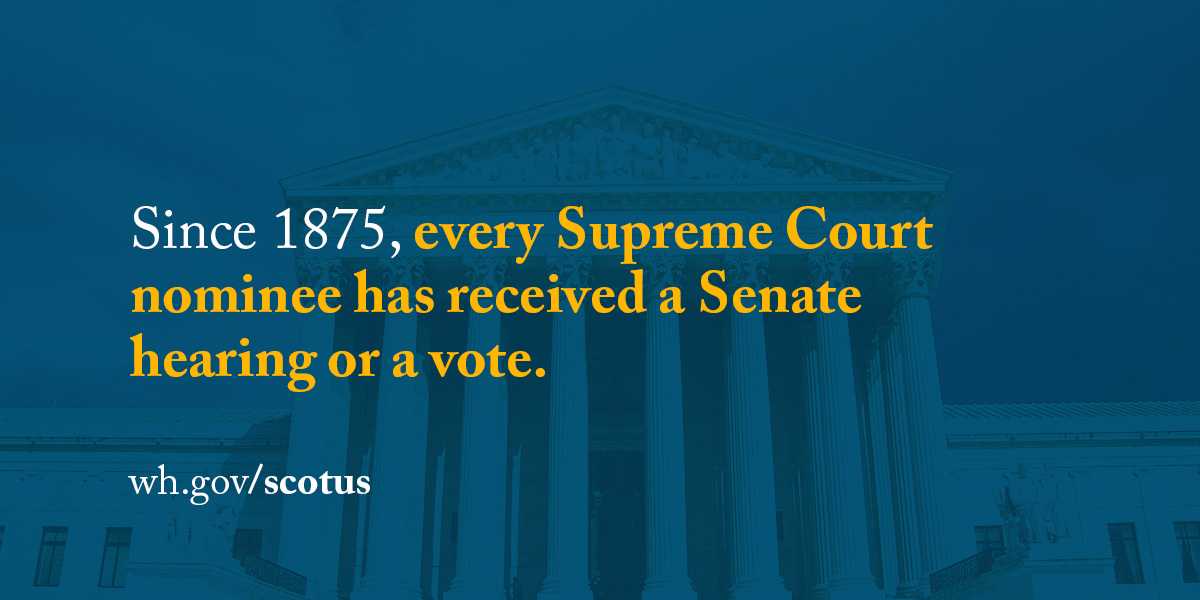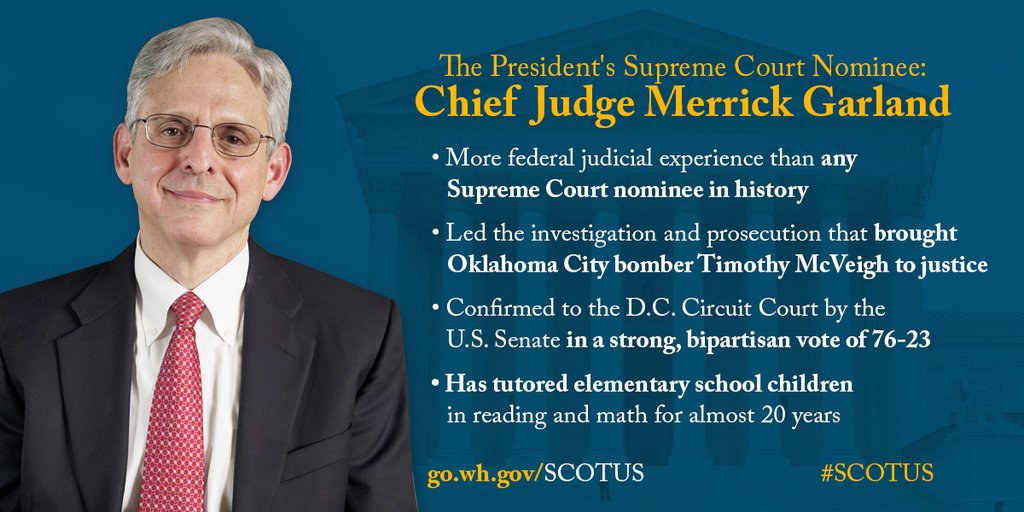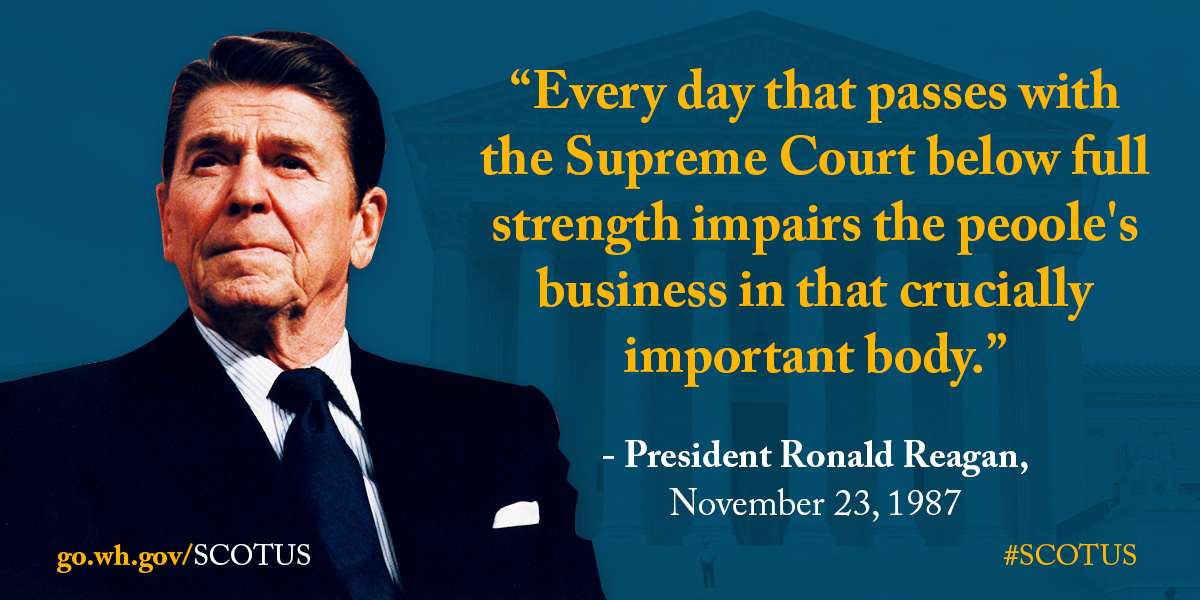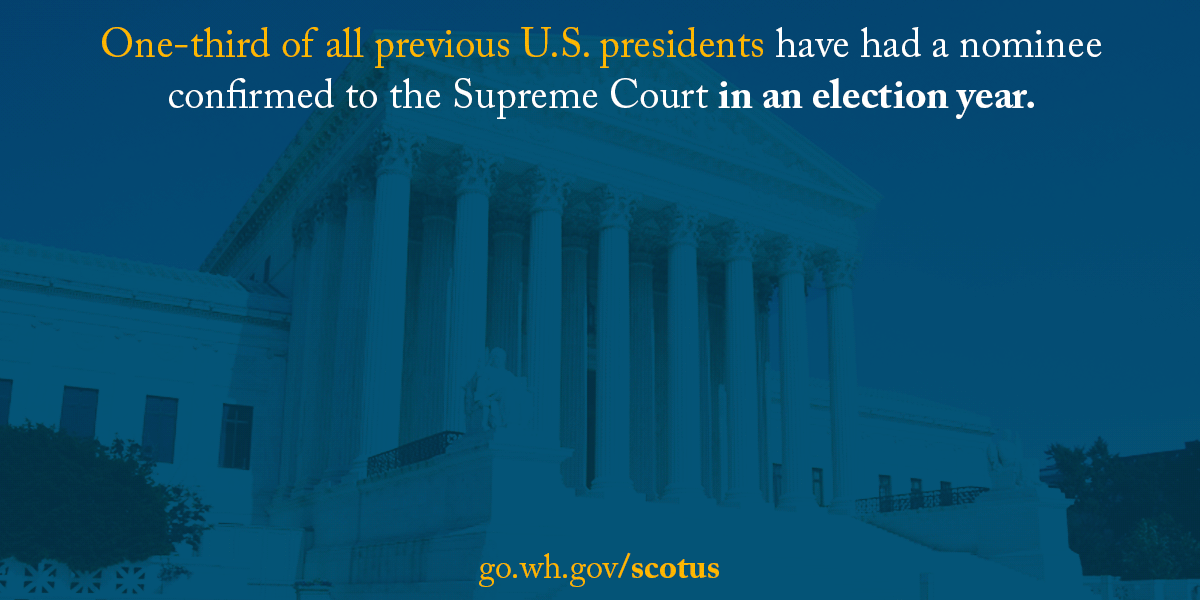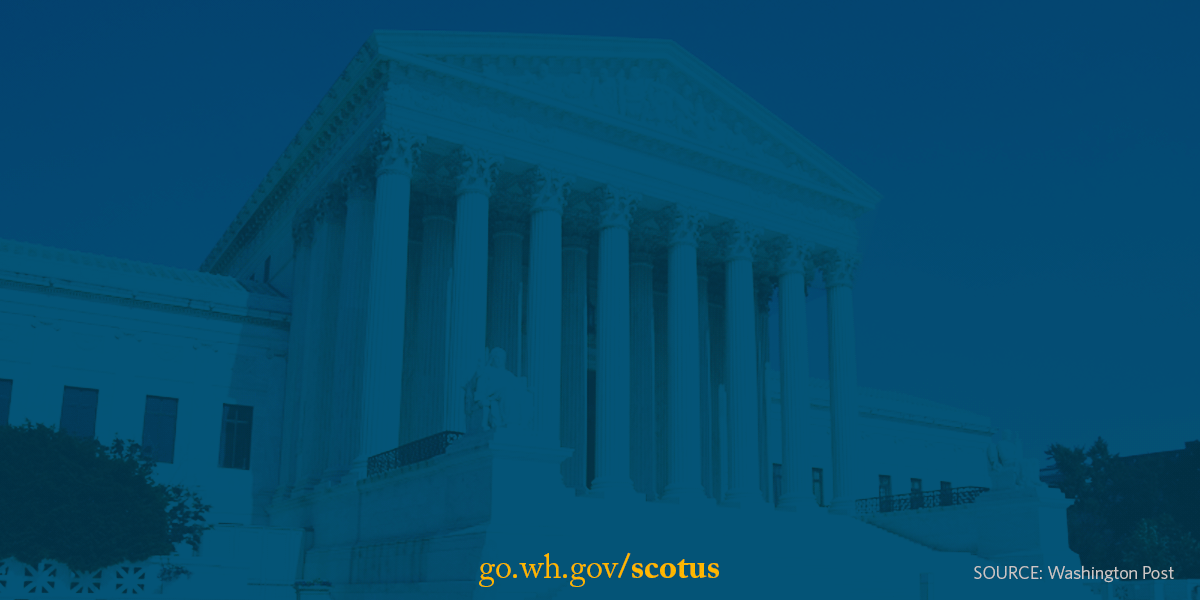President Obama's
Supreme Court Nomination
SCOTUS Road Ahead
The Senate's Constitutional Responsibility to Act
The confirmation of a Supreme Court Justice is a solemn responsibility that the President and the Senate share under the U.S. Constitution.
Throughout history, members of both parties in Congress and in the White House have done their jobs so that the Judicial Branch can do its own. Failing to do so would be an unprecedented dereliction of duty.
The Senate has almost a full year to consider and confirm a nominee. In fact, since 1975, the average time from nomination to confirmation is 67 days. The longest time before confirmation in the past three decades was 99 days, for Justice Thomas, and the last four Justices, spanning two Administrations, were confirmed in an average of 75 days.
The Facts
Six Justices have been confirmed in a presidential election year since 1900.
Every nominee who was not withdrawn has received a vote within 125 days of nomination.
It will be harmful and create unsustainable uncertainty if Congress fails to act on the President's nominee.
Here's a look at where President Obama's Supreme Court nominee stands in the confirmation process compared to those of recent nominees under three different administrations.
SCOTUS FAQ
Read the FAQs
Q: Has Judge Garland issued opinions hostile to gun owners?
A: No. Chief Judge Garland has never issued or joined an opinion involving the Second Amendment.
Some right-wing special interest groups are spending millions of dollars trying to distort Judge Garland’s record by misrepresenting his votes in two cases. Independent fact-checkers have already deemed those attacks “false,” but let’s look at the facts. In 2008, a D.C. Circuit panel that did not include Chief Judge Garland struck down parts of a Washington, D.C. gun control law in Parker v. District of Columbia, a decision that was eventually affirmed by the Supreme Court in District of Columbia v. Heller. Chief Judge Garland joined one of President George H.W. Bush’s appointees and two other judges in voting to grant rehearing by the full court.
A vote for rehearing by the full court is simply a request to have more judges take a look at the legal matter.
Judge Garland’s vote to request rehearing does not indicate anything about his views on the Second Amendment. The D.C. Circuit’s rules say that rehearing by the full court is only appropriate in certain circumstances, such as where the case involves a question of exceptional importance.
As Chief Justice Roberts explained at his confirmation hearing, there are many reasons judges vote for rehearing, including that a case involves important questions that the court “ought to look at” more closely. This case was the first federal court decision to strike down a statute on Second Amendment grounds in decades. Chief Judge Garland was also on the D.C. Circuit when it denied full court rehearing in Heller II, a September 2015 panel decision invalidating various portions of a new D.C. gun control law under the Second Amendment.
The second case, the 2000 decision in NRA v. Reno, does not reflect any views on the Second Amendment, but rather Chief Judge Garland’s careful case-by-case approach to judging. This case was about a Justice Department regulation that allowed the Department to temporarily retain certain data generated during background checks of prospective firearms purchasers that are required by federal law. The Department kept the data for a limited period to review the background system to ensure accuracy and privacy. Garland voted with the majority to uphold the regulation, in an opinion that concluded that the Department had reasonably interpreted the Brady Act to permit retaining the data temporarily to conduct audits. The D.C. Circuit emphasized that the audit records did not represent a “system for the registration of firearms, firearms owners, or firearms transactions” and that the creation of any such system would be barred by statute. The case was about administrative law and did not mention the Second Amendment.
Chief Judge Garland is a balanced judge who approaches every case with an open mind. In fact, many conservative voices – including an NRA attorney -- agree:
-
President George W. Bush’s judicial nominee Miguel Estrada has said, “The evidence that is being cited for the accusation that Judge Garland has some bias against Second Amendment rights is from thin to nonexistent.”
-
Independent fact-checker Politifact looked at the claim about D.C’s gun laws and found that: "Garland never heard the case about Washington gun laws from the bench, and so he never voted on it."
-
NRA Attorney Charles Cooper wrote that his "high opinion of Judge Garland has not changed — indeed, it has only strengthened — over the course of the 19 years since I wrote these words. The qualities that I saw in Merrick Garland as a nominee to the D.C. Circuit have been displayed in abundance by Judge Garland as a member of that court.”
-
Renowned Second Amendment defender, Senator Orrin Hatch called Chief Judge Garland “a fine man” and “a consensus nominee,” continuing to praise him long after these cases were heard.
Judge Garland’s long record as the most well-respected judge on the nation’s most important appeals court illustrates that he is a careful, thoughtful judge who shows respect for both the rule of law and its impact of the law on the lives of ordinary Americans. He’s issued opinions that have garnered support from colleagues appointed by both Democratic and Republican presidents, and he will no doubt continue to be a consensus-builder when he begins serving on the Supreme Court.
Q: Who was involved in the selection process?
A: Brian Deese, Senior Advisor to the President, and White House Counsel Neil Eggleston oversaw a broad process that involved other key members of the President’s team such as Valerie Jarrett, Senior Advisor to the President. Over the course of this past month, the White House consulted Senate leadership, other members of Congress, leaders of the bar, and a broad array of other stakeholders. But at the end of the day, it was the President who made this decision. Over the last month, he considered many excellent, highly qualified candidates with diverse backgrounds and varied life experiences. From those candidates, the President selected the person he believes is best for the job. That candidate is Chief Judge Garland.
Q: Has the President normally taken this much time to choose a Supreme Court nominee?
A: It has only been a month since Justice Scalia unexpectedly passed away. That is about as long as the President took to nominate his two previous nominees for the Supreme Court. The President has made clear he takes this process extremely seriously and wanted to balance his goal of moving swiftly with ensuring he nominated an excellent, highly qualified nominee. In that time, the President considered many qualified candidates with diverse backgrounds and varied life experiences. From those candidates, the President selected the person he believes is best for the job. That candidate is Chief Judge Garland.
In addition, over the last four decades, the US Senate has taken, on average, 67 days to confirm a President's nominee to the Supreme Court. It's currently mid-March. That means, there is ample time for the Senate to consider Judge Garland's nomination and confirm him to the Supreme Court before the next SCOTUS term starts at the beginning of October.
Q: Will Chief Judge Garland have a hearing in the Senate?
A: Now that the President has fulfilled his constitutional responsibility to nominate someone who is highly qualified to fill the vacancy on the Supreme Court, he looks forward to the Senate doing its job of holding a hearing and allowing members to vote on the nominee. That’s what is written in the Constitution and what the American people expect and deserve.
Q: Will Chief Judge Garland get confirmed?
A: Article II, Section 2 of the Constitution clearly spells out how the confirmation process is supposed to work. The President took that constitutional responsibility seriously, consulting with both Democratic and Republican Senators and even inviting them to put forward potential nominees for his consideration. The result of his consultations and rigorous process is the decision to nominate a thoughtful, meticulous, moderate judge for the Supreme Court with a keen ability for building consensus.
Chief Judge Merrick Garland was confirmed to the D.C. Circuit Court
The President fully expects Congress to honor their constitutional responsibility and allow this nominee a hearing and a vote. Despite repeated declarations that they will ignore such a responsibility, the President believes there will be enough Republicans listening to Americans and editorial boards across the country to honor their oath of office and do their job regardless of their party’s political leadership.
SCOTUS Quote
“
Judge Garland is a preeminent member of the legal profession with outstanding legal ability and exceptional breadth of experience. He meets the highest standards of integrity, professional competence and judicial temperament. It is the unanimous opinion of the Standing Committee that Judge Garland is “Well Qualified” to serve as an Associate Justice of the Supreme Court of the United States.
”
The nonpartisan American Bar Association
SCOTUS Validators
What They've Said
“Everybody is pretty much unanimous that by temperament, experience, and background, he is a very suitable person for the Supreme Court. The argument about the vacancy isn't entirely political.”
Miguel Estrada,
a conservative judicial nominee appointed by Pres. George W. Bush
“"[My] high opinion of Judge Garland has not changed — indeed, it has only strengthened...The qualities that I saw in Merrick Garland as a nominee to the D.C. Circuit have been displayed in abundance by Judge Garland as a member of that Court.”
Charles Cooper,
Lawyer for the National Rifle Association
Read the quote in context.
“I can hardly imagine how one could mount a personal attack against Judge Garland.”
Michael Chertoff,
Secretary of Homeland Security under Pres. George W. Bush
SCOTUS credentials
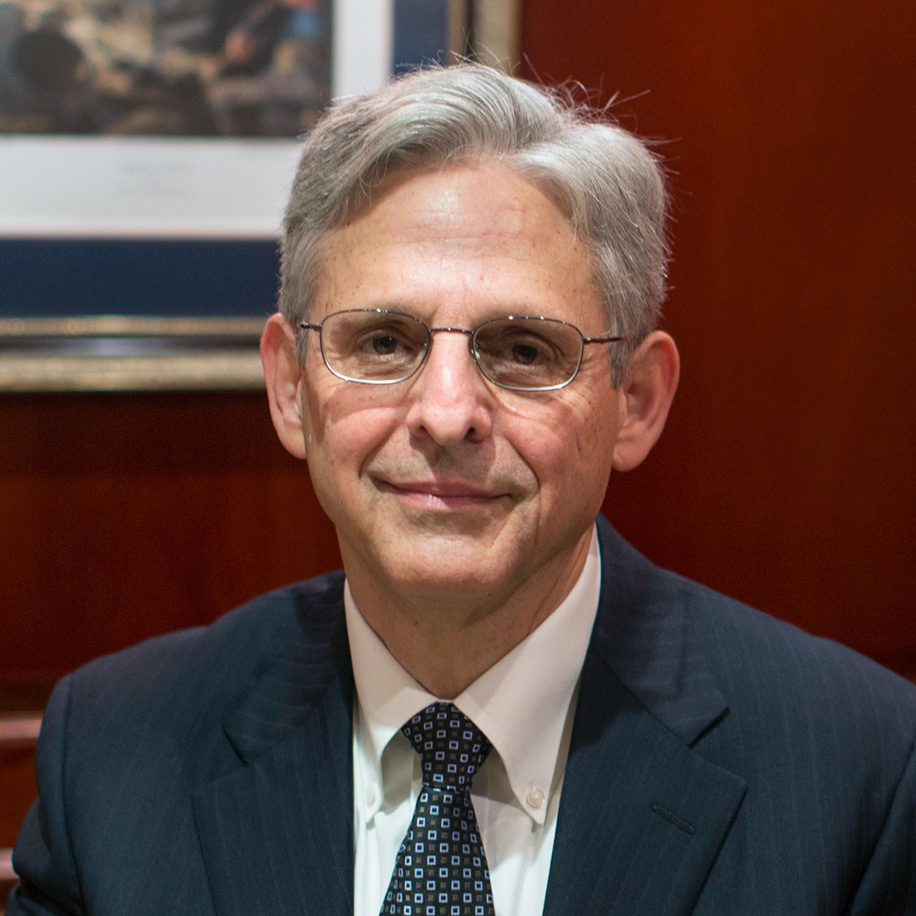
Current Position:
Chief Judge of the U.S. Court of Appeals for the District of Columbia
Years Federal Judiciary Experience:
18
Home state:
Illinois
The Honorable Merrick B. Garland
As Chief Judge of the most important federal appeals court in the nation, no one is more qualified to immediately serve on the Supreme Court than Merrick Garland.
A meticulous jurist with a record of forging consensus among judges across the ideological spectrum, he was confirmed to sit on the U.S. Court of Appeals in D.C. in 1997 with majority support from both parties in the U.S. Senate. Today, as Chief Judge of the D.C. Circuit, Judge Garland has more federal judicial experience than any Supreme Court nominee in history.
Here’s an overview of Chief Judge Garland’s record and credentials:
-
Oversaw some of the most important federal criminal cases in recent history, including the prosecutions of Timothy McVeigh and Terry Nichols for the Oklahoma City bombing as well as the government’s responses to the Unabomber and the Montana Freemen
-
Took steps as a government attorney to ensure proper respect for the rights of criminal defendants, helping develop policies that require prosecutors to conduct an individual assessment of each case when making charging decisions, rather than just charging with the most serious offense possible
-
Was confirmed to the D.C. Circuit in 1997 in a strong bipartisan vote of 76-23
-
Distinguished himself as a jurist who decides every case based on what the law requires
SCOTUS Bio
The Biography of the Honorable Merrick Garland
Born and raised in Illinois by a mother who served as a community volunteer and a father who ran a small business out of the family home, Chief Judge Garland was valedictorian of his public high school class. He won scholarships to attend Harvard University, where he graduated summa cum laude, and Harvard Law School, where he received his law degree magna cum laude and served on the Harvard Law Review. While in college, Garland worked a summer job as a shoe store stock clerk and sold his comic book collection to help pay his tuition. As a law student, he earned room and board by counseling undergraduates.
Following law school, he clerked for Supreme Court Justice William Brennan, who called him “a person of exceptional talent and great personal integrity” and “one of the best” clerks Brennan had.
Judge Garland has dedicated his life to serving the American people, taking on some of the most difficult anti-terrorism cases in our nation’s history. In the wake of the Oklahoma City bombing, he led the investigation and prosecution that ultimately brought Timothy McVeigh to justice.
As a mentor to his law clerks and a tutor to elementary school children, he is a dedicated and compassionate public servant who will conservatives and progressives praise for his rigorous intellect, his respect for the role of the judiciary, and his mastery of the law.
Chief Judge Garland and his wife of nearly 30 years, Lynn, have two daughters, Becky and Jessie. The family enjoys skiing, hiking, and canoeing, and together they have visited many of America’s national parks.

Chief Judge Garland on a family outing with his wife and two daughters.
